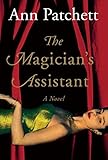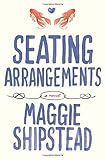
 I am very bad at reading books at the right time — if a book is freshly published and sitting face out on a shelf, there is little to no chance that I will read it within the year. I buy it, of course (gotta support the authors and the local bookstores) and then I put it on the stack and make it wait its turn. This year was no exception — most of my favorite reads were either galleys of books that will come out in 2013 or older books that finally made it to the top of the bedside tower. The galleys were books that I blurbed or books that my friends wrote (or both), so perhaps it’s a bit gauche to name them here, but I will anyway. Early 2013 is going to be off the chain: Stuart Nadler’s epic American slam-dunk of a novel, Wise Men; Ariel Djanikian’s scientifically terrifying post-apocalyptic novel The Office of Mercy; Jessica Francis Kane’s crystalline and beautiful new story collection, This Close; Jennifer Gilmore’s achingly sad and moving novel about adoption, The Mothers. And that’s just the first few months of next year.
I am very bad at reading books at the right time — if a book is freshly published and sitting face out on a shelf, there is little to no chance that I will read it within the year. I buy it, of course (gotta support the authors and the local bookstores) and then I put it on the stack and make it wait its turn. This year was no exception — most of my favorite reads were either galleys of books that will come out in 2013 or older books that finally made it to the top of the bedside tower. The galleys were books that I blurbed or books that my friends wrote (or both), so perhaps it’s a bit gauche to name them here, but I will anyway. Early 2013 is going to be off the chain: Stuart Nadler’s epic American slam-dunk of a novel, Wise Men; Ariel Djanikian’s scientifically terrifying post-apocalyptic novel The Office of Mercy; Jessica Francis Kane’s crystalline and beautiful new story collection, This Close; Jennifer Gilmore’s achingly sad and moving novel about adoption, The Mothers. And that’s just the first few months of next year.
 Then there were the books that everyone else had already read and loved: Chad Harbach’s The Art of Fielding, which made me swoon over descriptions of baseball, which I otherwise find excruciatingly boring; Tana French’s In the Woods, which made me want to read her entire catalog in a single sitting; Ann Patchett’s The Magician’s Assistant, which made me want to levitate; Paula Fox’s Desperate Characters, which made me think twice about petting feral cats in Brooklyn.
Then there were the books that everyone else had already read and loved: Chad Harbach’s The Art of Fielding, which made me swoon over descriptions of baseball, which I otherwise find excruciatingly boring; Tana French’s In the Woods, which made me want to read her entire catalog in a single sitting; Ann Patchett’s The Magician’s Assistant, which made me want to levitate; Paula Fox’s Desperate Characters, which made me think twice about petting feral cats in Brooklyn.

 I actually like waiting to read books, because then the hoopla has hooped down the street and the buzz has stopped buzzing and it’s just you and the page in front of you, and then the page after that. Still, even I am occasionally immune to my own rules, and accidentally read a book immediately after purchasing it. This year, I gulped down Maria Semple’s Where’d You Go, Bernadette, Maggie Shipstead’s Seating Arrangements, and Jess Walter’s Beautiful Ruins. Each one was precise, skilled, quick-witted, and warm-hearted. Well worth the price of (hardcover) admission and all of the (richly deserved) accolades. Sometimes all that buzz is there for a reason.
I actually like waiting to read books, because then the hoopla has hooped down the street and the buzz has stopped buzzing and it’s just you and the page in front of you, and then the page after that. Still, even I am occasionally immune to my own rules, and accidentally read a book immediately after purchasing it. This year, I gulped down Maria Semple’s Where’d You Go, Bernadette, Maggie Shipstead’s Seating Arrangements, and Jess Walter’s Beautiful Ruins. Each one was precise, skilled, quick-witted, and warm-hearted. Well worth the price of (hardcover) admission and all of the (richly deserved) accolades. Sometimes all that buzz is there for a reason.
More from A Year in Reading 2012
Don’t miss: A Year in Reading 2011, 2010, 2009, 2008, 2007, 2006, 2005
The good stuff: The Millions’ Notable articles
The motherlode: The Millions’ Books and Reviews
Like what you see? Learn about 5 insanely easy ways to Support The Millions, and follow The Millions on Twitter, Facebook, Tumblr.









